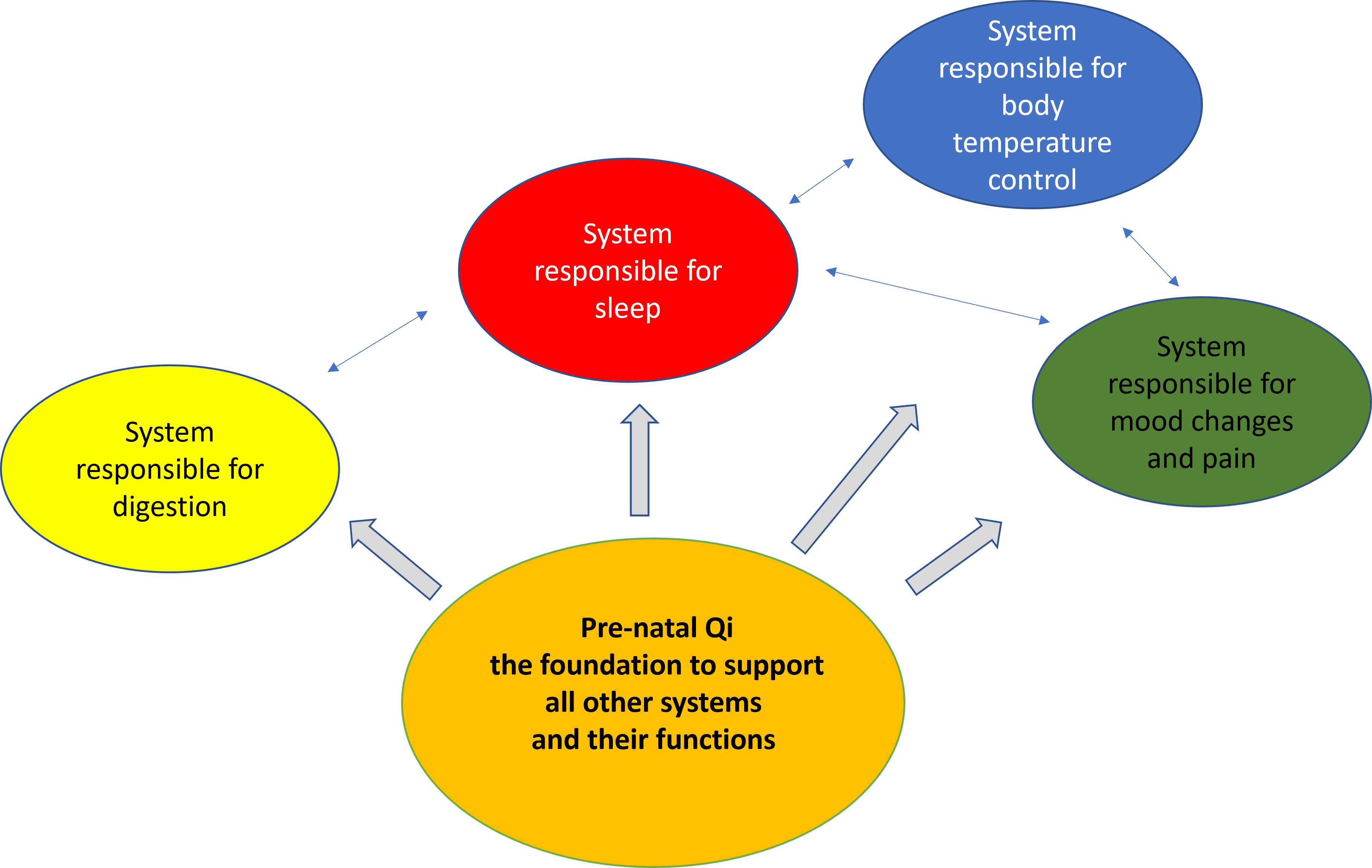In part 1, we explained the complex factors contributing to menopausal related insomnia, hot flushes and mood changes. This part 2 explains how Chinese medicine understands the complex interaction, and how acupuncture might provide a promising approach to comorbid depression and insomnia in perimenopause. For detailed information, please read a recent review by researchers from the RMIT University.
Chinese medicine view
Chinese medicine understands that pre-natal Qi determines our growth, maturity, fertility and longevity. It supports all other body functions as showing in Diagram 1. When we reach 45 to 55 years old, we experience a sharp decline in pre-natal Qi, leading to a sharp withdrawal of support to other functions and causing imbalance among those systems. This explains why we suddenly develop various signs and symptoms, such as sleep problem, hot flushes, and mental changes, and why pre-existing injuries or pains become worse.

From Chinese medicine point of view, each person has a unique pattern of imbalance and varied combination of sleep, hot flushes, and mood changes. Some may have hot flushes and night sweats, feel irritable and anxious, and frequently waken up throughout the night; some may experience alternating hot and cold throughout the night, and stay awake after early hours of the morning, say 2-4 am; some do not experience any hot flushes, yet have difficulties in falling and maintaining asleep, feel depressed and experience lots of abdominal distension. Those different presentations are results of a combination of the pre-existing dynamic relationship among those systems prior to menopause and the current situation in our life, what we do, how we deal with issues in life etc.
In our Geelong Clinic, we develop individualised acupuncture treatment plans, and ways to address sleep hygiene. The effect of acupuncture can be explained by helping re-balance the dynamic relationship through
- Strengthening the pre-natal Qi;
- Calming the systems involved in sleep;
- Stabilising the mood.
How does acupuncture work: Modern Science View
Modern research has found that acupuncture may improve perimenopausal depression and insomnia through multiple pathways: regulating reproductive hormones and their receptors; moderating neurotransmitters, signaling pathways, and oxidative stress; tone down hypothalamic-pituitary-adrenal and -ovarian hyperactivity. Of course, further research is required.
Evidence for effectiveness and safety of acupuncture
A significant amount of evidence supports the usefulness and safety of acupuncture. So far there have been over 30 systematic reviews and/or meta-analyses regarding acupuncture treatment for depression or insomnia. Acupuncture can be used alone or as an adjuvant therapy for patients with depression or insomnia, and could be particularly helpful to those who are intolerant to anti-depressants or hypnotic drugs. Acupuncture is safe when used alone or in combination with anti-depressants, and it may reduce the dose of medications. So far there is no acupuncture clinical trial that specifically addresses the combined depression and insomnia in peri-menopausal women. A RMIT multidisciplinary team is addressing this significant clinical problem.
What to expect
In all the clinical trials 8 to 16 sessions of acupuncture treatment with twice to three times a week treatment are required for a clinically significant effect. It usually takes 3-4 sessions to show some effects. Then the effect may continue to get better or plateaued. It is very important to be persistent in treatment for a sustained positive outcome.
